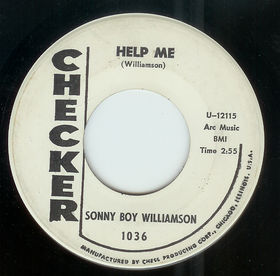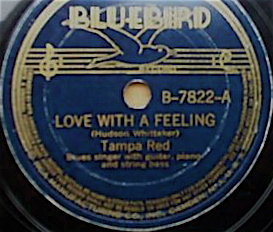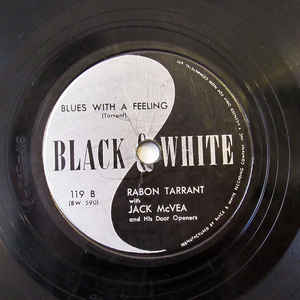Related Research Articles

William James Dixon was an American blues musician, vocalist, songwriter, arranger and record producer. He was proficient in playing both the upright bass and the guitar, and sang with a distinctive voice, but he is perhaps best known as one of the most prolific songwriters of his time. Next to Muddy Waters, Dixon is recognized as the most influential person in shaping the post–World War II sound of the Chicago blues.

"Mannish Boy" is a blues standard written by Muddy Waters, Mel London, and Bo Diddley. First recorded in 1955 by Waters, it serves as an "answer song" to Bo Diddley's "I'm a Man", which was in turn inspired by Waters' and Willie Dixon's "Hoochie Coochie Man". "Mannish Boy" features a repeating stop-time figure on one chord throughout the song.

"Goin' Down Slow" or "Going Down Slow" is a blues song composed by American blues singer St. Louis Jimmy Oden. It is considered a blues standard and "one of the most famous blues of all".

"Baby, Please Don't Go" is a traditional blues song that was popularized by Delta blues musician Big Joe Williams in 1935. Many cover versions followed, leading to its description as "one of the most played, arranged, and rearranged pieces in blues history" by French music historian Gérard Herzhaft.

Willie James Mabon was an American R&B singer, songwriter, pianist, and harmonica player. He had two number one hits on the Billboard R&B chart, "I Don't Know" in 1952 and "I'm Mad" in 1953.

"Rollin' and Tumblin'" is a blues standard first recorded by American singer-guitarist Hambone Willie Newbern in 1929. Called a "great Delta blues classic", it has been interpreted by hundreds of Delta and Chicago blues artists, including well-known recordings by Muddy Waters. Rock musicians usually follow Waters' versions, with the 1960s group Cream's rendition being perhaps the best known.

"Trouble No More" is an upbeat blues song first recorded by Muddy Waters in 1955. It is a variation on "Someday Baby Blues", recorded by Sleepy John Estes in 1935. The Allman Brothers Band recorded both studio and live versions of the song in the late 1960s and 1970s.
"Wang Dang Doodle" is a blues song written by Willie Dixon. Music critic Mike Rowe calls it a party song in an urban style with its massive, rolling, exciting beat. It was first recorded by Howlin' Wolf in 1960 and released by Chess Records in 1961. In 1965, Dixon and Leonard Chess persuaded Koko Taylor to record it for Checker Records, a Chess subsidiary. Taylor's rendition quickly became a hit, reaching number thirteen on the Billboard R&B chart and number 58 on the pop chart. "Wang Dang Doodle" became a blues standard and has been recorded by various artists. Taylor's version was added to the United States National Recording Registry in 2023.

William Robert Emerson, known during his recording career as Billy "The Kid" Emerson and more recently as Rev. William R. Emerson, was an American R&B and rock and roll singer and songwriter turned preacher, best known for his 1955 song, "Red Hot."
"One Way Out" is a blues song that was recorded in the early 1960s by both Sonny Boy Williamson II and Elmore James. A reworking of the song by G. L. Crockett, titled "It's a Man Down Here", appeared on the Billboard record charts in 1965. In 1971, the Allman Brothers Band recorded an updated live version of the song, which was included on their popular Eat a Peach album (1972).

"Evil", sometimes listed as "Evil (Is Going On)", is a Chicago blues song written by Willie Dixon. Howlin' Wolf recorded the song in Chicago for Chess Records in 1954. It was included on the 1959 compilation album Moanin' in the Moonlight. When he re-recorded it for The Howlin' Wolf Album in 1969, "Evil" became Wolf's last charting single, reaching number 43 Billboard R&B chart.

"My Babe" is a Chicago blues song and a blues standard written by Willie Dixon for Little Walter. Released in 1955 on Checker Records, a subsidiary of Chess Records, the song was the only Dixon composition ever to become a number one R&B single and it was one of the biggest hits of either of their careers.
"I'm Ready" is a blues song written by Willie Dixon and first recorded by Muddy Waters in 1954. It was a hit, spending nine weeks on the Billboard R&B chart where it reached number four. The song became a blues standard and has been compared to "Hoochie Coochie Man", the standard also written by Dixon that Waters recorded earlier in 1954.

"Forty-Four" or "44 Blues" is a blues standard whose origins have been traced back to early 1920s Louisiana. However, it was Roosevelt Sykes, who provided the lyrics and first recorded it in 1929, that helped popularize the song. "Forty-Four," through numerous adaptations and recordings, remains in the blues lexicon eighty years later.

"Help Me" is a blues standard first recorded by Sonny Boy Williamson II in 1963. The song, a mid-tempo twelve-bar blues, is credited to Williamson, Willie Dixon, and Ralph Bass and is based on the 1962 instrumental hit "Green Onions" by Booker T. and the MGs. "Help Me" became a hit in 1963 and reached number 24 in the Billboard R&B chart.

"That's All Right"or "That's Alright" is a blues song adapted by Chicago blues singer and guitarist Jimmy Rogers. He recorded it in 1950 with Little Walter on harmonica. Although based on earlier blues songs, music writer John Collis calls Rogers' rendition "one of the most tuneful and instantly memorable of all variations on the basic blues format". The song became a blues standard and has been recorded by numerous blues and other artists.

"You've Got to Love Her with a Feeling", or "Love with a Feeling" as it was originally titled, is a blues song first recorded by Tampa Red in 1938. Numerous blues artists have interpreted and recorded the song, making it a blues standard. When Freddie King adapted it in 1961, it became his first single to appear in the record charts.

"Blues with a Feeling" is a blues song written and first recorded by Rabon Tarrant with Jack McVea and His All Stars in 1947, as the B-side of "Slowly Goin' Crazy Blues". Although the original release was commercially unsuccessful, the song later became an important hit for Little Walter, with whom it is usually identified.

"You Don't Love Me" is a rhythm and blues-influenced blues song recorded by American musician Willie Cobbs in 1960. Adapted from Bo Diddley's 1955 song "She's Fine She's Mine", it is Cobbs' best-known song and features a guitar figure and melody that has appealed to musicians in several genres.
Lacy Gibson was an American Chicago blues guitarist, singer and songwriter. He notably recorded the songs "My Love Is Real" and "Switchy Titchy" and in a long and varied career worked with Buddy Guy and Son Seals.
References
- 1 2 "The Chess Label Part II (1953-1955)". A Collector's Guide to the Music of Chuck Berry. The Red Saunders Research Foundation. Retrieved 29 September 2021.
- ↑ Herzhaft, Gerard (1992). "Willie Mabon". Encyclopedia of the Blues. Fayetteville, Arkansas: University of Arkansas Press. p. 215. ISBN 1-55728-252-8.
- ↑ Dahl, Bill. "Willie Mabon –Biography". AllMusic . Retrieved October 26, 2020.
- ↑ Whitburn, Joel (2004). Top R&B/Hip-Hop Singles: 1942–2004. Record Research. p. 369.
- ↑ "Willie Mabon: 'I Don't Know' –Appears on". AllMusic . Retrieved October 26, 2020.